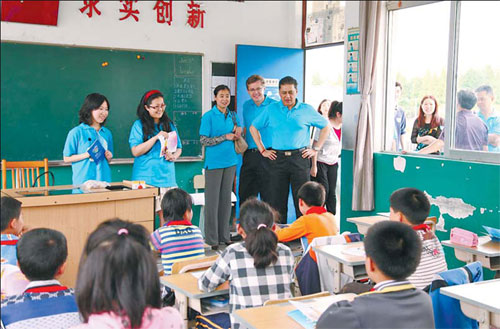Nurturing young minds with nutrition
|
Pradeep Pant (right), president of Kraft Foods, Asia-Pacific Region, visiting Haiqiao School in Chongming island, Shanghai. Pant's company donated a Kraft Hope Kitchen to the school to help it to improve its students' health. Kraft Hope Kitchen is a charity project jointly initiated by Kraft Foods China and China Youth Development Foundation in October 2009. Provided to China Daily |
A brand new Kraft Hope Kitchen was put into use in Haiqiao School in Chongming island, Shanghai, on June 5 to provide nutritionally balanced meals to students.
It is the 151st kitchen that Kraft Foods Inc has built in China, according to Pradeep Pant, president of Kraft Foods, Asia-Pacific Region.
In addition, there will be a total of 200 kitchens established in the nation by the end of 2012.
"More than 100,000 students will benefit from the project," he said.
Unlike most kitchens that have been built in underdeveloped rural areas, such as in Anhui, Yunnan, Jilin, Hunan and Hebei provinces, Kraft Foods this time chose Chongming Island, just a two-hour drive from downtown Shanghai.
"Schools in rural areas far from any city were our initial choice for our project. Also the stay-at-home and migrant workers' children," said Pant.
"We invest significantly in those areas of great need in order to help children to improve their health."
The latest kitchen was the first Kraft has built especially for stay-at-home migrant workers' children.
"It is very exciting to see smiles on children's faces," said Shawn Warren, president of Kraft Foods, China, adding children living around the more developed cities also need good school kitchens for their meals.
"We provide them with the right nutrition because, as is well known, with proper nutrition children will learn better," Warren added.
"Our partners and volunteers also want to have closer access when they contribute something in addition to their work," he said. "After the kitchen was built volunteers can visit the school on a regular basis. They will examine the hygiene and other issues affecting the kitchen."
Currently Kraft Foods Inc has more than 2,000 volunteers from its employees involved in the kitchen project.
Compared with schools in the city, the Haiqiao School is much smaller in scale and number of students. Only 130 youngsters currently study there. In the city, a primary school normally has about 2,000 students.
"In recent years, more and more local residents have left for the city to get a job. Some bring their child with them, some leave the youngster at home with the elders," said 52-year-old Xu Mingsheng, the principal of the school.
"We also have had some migrant workers move on to the island," he said.
The price per meal at school is 5 yuan ($0.79). It includes one bowl of soup, one portion of rice, one portion of vegetable and meat.
Currently, about 45 percent of the students have lunch at the school, including 25 percent of migrant workers' children and 20 percent of stay-at-home children, whose parent went to the city for work.
In recent years in Shanghai, because of a lack of taxi drivers, lots of taxi companies began to hire people from Chongming Island, where people can speak the Shanghai dialect.
Most stay-at-home and migrant worker's children have more than enough nutrition, Xu said. In a recent examination of youngsters conducted at the school, 97 percent were deemed healthy.
The school designed the menu specially to the children's digestive habits, he said.
Everyone involved in the kitchen project has received training in children's nutrition and food hygiene and safety practice by the company.
"I have to stay in school for lunch for five days at a time," said Wang Xiaoyan, 7, whose parents are migrant workers from Guangzhou province. "I have no one to cook for me at home - my parents are busy at work."
Kraft Hope Kitchen is a charity project jointly initiated by Kraft Foods China and China Youth Development Foundation in October 2009. This project aims to improve the food supply and nutrition of rural Chinese children and to improve nutritional knowledge and food safety practices of rural teachers and kitchen staff.
The kitchen that Kraft Foods Inc provided is equipped with standard cooking utensils, a refrigerator, a disinfection cabinet, nutrition guidelines and food safety practice posters and booklets.
Chunmiao Public Kitchen and Free Lunch Program are another two projects that aim to improve the nutritional content of children's meals in China.
Contact the writer at [email protected].

























